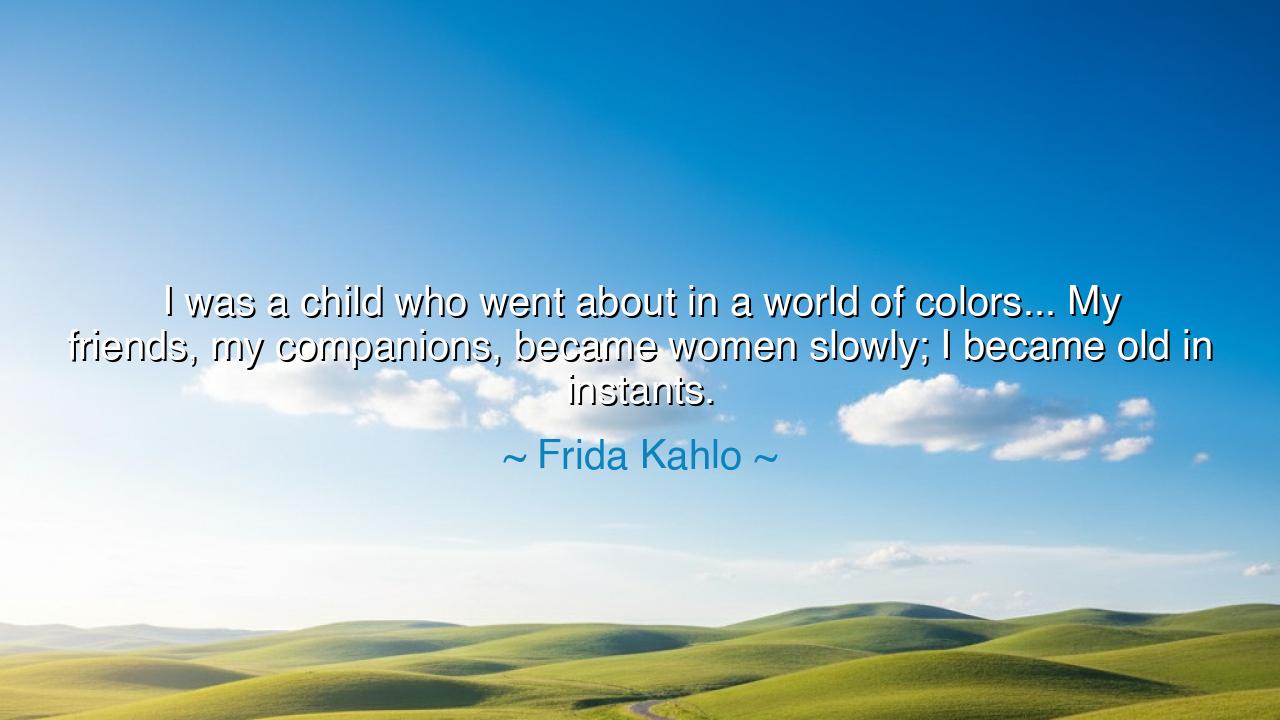
I was a child who went about in a world of colors... My friends
I was a child who went about in a world of colors... My friends, my companions, became women slowly; I became old in instants.






O children of the future, listen to the words of Frida Kahlo, whose life and art were woven from both pain and beauty. "I was a child who went about in a world of colors... My friends, my companions, became women slowly; I became old in instants." In these words, she paints a picture of the transition from the vibrant world of youth to the sobering realities of adulthood. As a child, the world is full of colors, full of wonder and possibility. Yet as Frida reflects, that innocence fades as the years pass, and the women she once knew become transformed by time, just as she herself was marked by the instants of change that made her grow old faster than the years would suggest.
In the ancient world, the journey from youth to adulthood was often depicted as a transition from the world of the gods to the world of mortality. Persephone, the daughter of Demeter, was taken from her childhood in the lush fields and made queen of the underworld. Her abduction and transformation into a queen symbolized the painful loss of innocence, the way in which youth and its vibrant colors fade when confronted with the harshness of reality. Frida’s words echo this universal truth—there is a moment in every life when the world of innocence is replaced by the burden of knowledge and experience, and with it, the colors of childhood become muted.
Consider the story of Odysseus, who left his youthful adventures behind as he journeyed into the trials of war and homecoming. The young Odysseus was full of dreams and boundless hope, but by the end of his long journey, he returned a man aged by his experiences. Much like Frida, Odysseus did not merely age with the passage of time but aged in instants, each one marked by the weight of loss, suffering, and the slow unraveling of his own identity. The colors of his youth faded as he learned the bitter lessons of war and homecoming, just as Frida found her own vibrancy dimmed by the pain she endured throughout her life.
The example of Joan of Arc offers another reflection of this transformation. The young Joan, full of fervor and belief in her divine mission, was a woman of light and youth. But the weight of battle, the betrayal she faced, and her eventual death left her a symbol of sacrifice and martyrdom. Her spirit, once fresh and untainted, became aged by the trials she endured. Like Frida, Joan’s youth was stripped away in an instant, as she faced the harsh reality of a world that could be both beautiful and cruel.
O children, let Frida Kahlo’s reflection remind you that life moves in the blink of an eye from youth to age, from colors to shadows. The transition from the innocence of childhood to the complexities of adulthood is inevitable and often painful, as it forces us to confront the impermanence of our experiences. Just as Frida saw her companions grow into women and herself age “in instants,” so too must we embrace the impermanence of all things. The vibrant colors of youth may fade, but they are replaced with the deep hues of wisdom, strength, and resilience that only time can provide. Let us honor both the light and dark moments of life, for they each have their place in the tapestry of our journey.






GDGold D.dragon
Frida’s reflection about her childhood world filled with colors and then becoming ‘old in instants’ is incredibly striking. It makes me think about the overwhelming impact of personal experiences on our growth and perception of time. What was it that made her feel like she was losing that childlike essence so quickly? Was it the pain and suffering she endured, or do you think it’s more about the awareness she had at such a young age?
PVphuong vy
Frida’s words are incredibly deep, suggesting that the shift from youth to adulthood wasn’t just a physical transformation for her, but an emotional one. The ‘world of colors’ might represent her creativity and carefree nature as a child, while the transition to women and growing old indicates a loss of that innocence. How do you think her unique life experiences shaped her perception of time and growing up? Do you think we all go through this kind of transformation, or was it more intense for her?
NMPhan Ngoc Minh
This quote from Frida Kahlo captures a powerful juxtaposition between the innocence of childhood and the inevitability of aging. The way she speaks of becoming old so quickly suggests that her life experiences, especially the painful ones, led her to mature faster than most. Do you think this rapid transition from childhood to adulthood is unique to artists like Frida, or is it something many people experience at some point in life?
HLnguyen ha linh
Frida’s reflection about her childhood world of colors feels so poignant, almost like she’s capturing a sense of innocence and vibrancy that fades as we grow. Her statement about becoming old ‘in instants’ speaks to the idea that some experiences can age you mentally or emotionally much faster than physically. What do you think caused her to feel that way at such a young age? Is it the toll of her personal struggles, or does it reflect a deeper, universal experience of growing up?